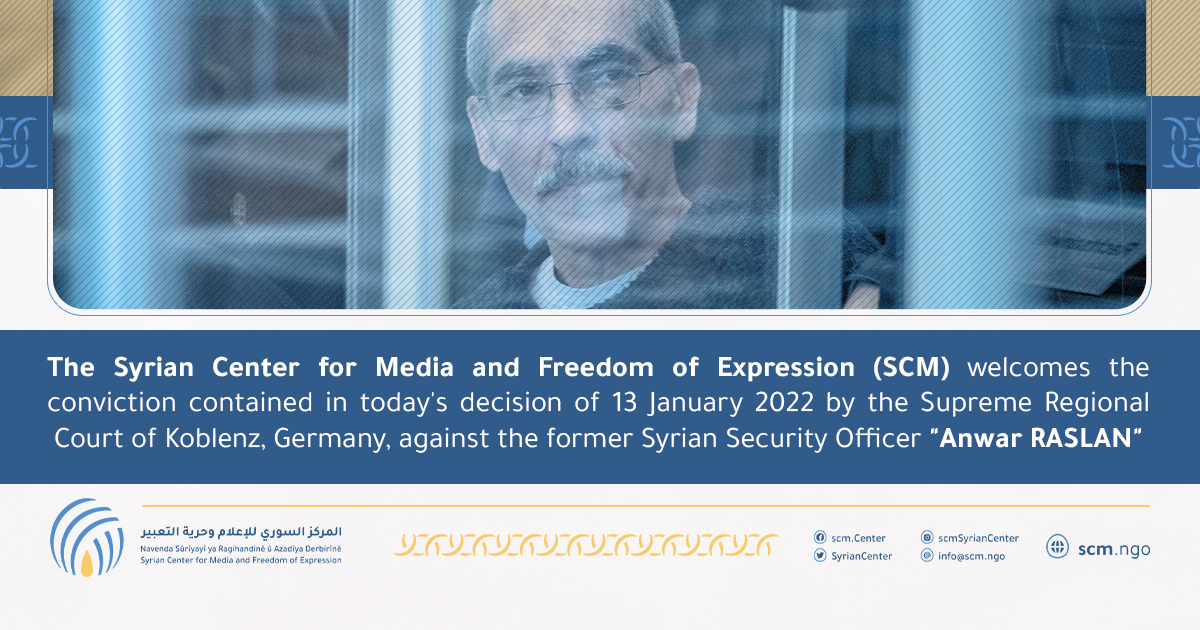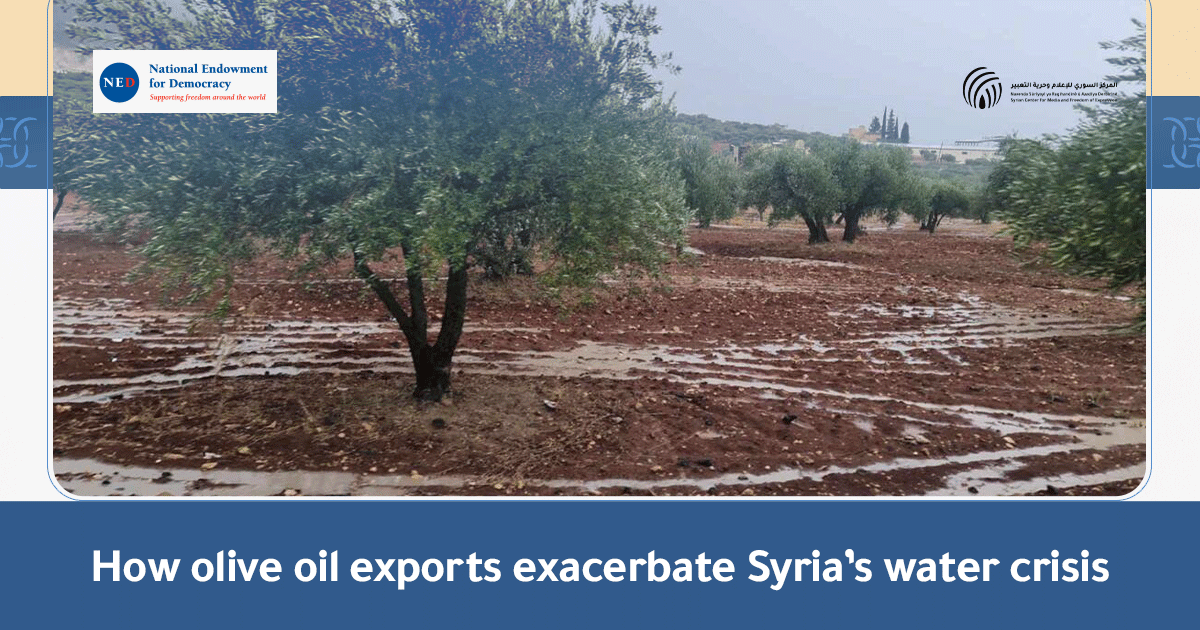Koblenz – Germany, Wednesday 13 January 2022
The Syrian Center for Media and Freedom of Expression (SCM) welcomes the conviction contained in today’s decision of 13 January 2022 by the Supreme Regional Court of Koblenz, Germany, in case No. (1STE 9/19) against the former Syrian Security Officer “Anwar RASLAN” – Head of the Investigation Department in Branch 251 (Al-Khatib Branch), General Intelligence Department -, residing in Germany, and sentenced by life imprisonment. for committing, ex officio, grave violations of human rights, represented by willful killing, severe deprivation of liberty and torture as crimes against humanity in addition to the crime of sexual violence.
We at the Syrian Center for Media and Freedom of Expression (SCM) believe that the subject of the case is not related to a personal feud between individuals resulting in punishment for the perpetrator as much as it is an issue linked organically to crimes and violations committed by officers and personnel of the Syrian security services in carrying out systematic policies based on an arbitrary arrest, torture, murder, and intimidation of civilians under the guidance and knowledge of the President of the Republic, the Commander-in-Chief of the Army and the Syrian Armed Forces to ensure the continuation of authoritarian power over the past decades, especially with the outbreak of the popular uprising in 2011. Accordingly, this provision, as a revelation of the truth and a title for it, rises the testimonies of witnesses and victims, and the reports and documentation the Syrian and the international human rights organizations on grave violations and crimes committed by the Syrian security services from the context of allegations to the level of evidence-based facts and legal facts.
SCM also emphasizes that the trial, which began on 20 April 2020, spanned 103 hearings to gather evidence of serious crimes committed in Syria, is the triumph of a fair trial and the guarantees it provides to the perpetrators, as well as to the victims, over the culture of vengeance, and an affirmation of the credibility of the incriminating evidence contained in the photos smuggled by the defector Caesar from Syria, which the court demanded to be examined by a forensic doctor who reviewed about /27 thousand/ photographs belonging to 6,821 victims, to examine the physical condition of the victims, and to testify about the cause of death and whether the victims’ testimonies to the police investigators correspond to the forensic findings.
This verdict – which is a milestone in the history of international criminal law, and legal documentation of the crimes and violations that took place in Syria in 2011 and 2012, and continues to this day – would not have been issued without the exceptional role played by the victims themselves and their determination to justice and reveal the truth in the first place. And had it not been for the courage of witnesses and defectors who supported the judicial process with their testimonies and the evidence they presented to the court, without neglecting the important role played by Syrian and international human rights organizations as an essential partner in this path to achieve justice.
In this context, lawyer Mazen DARWISH – Director General of the Syrian Center for Media and Freedom of Expression (SCM)- stressed that today’s verdict and other possible future verdicts by European judiciaries under Universal Jurisdiction or Extraterritorial Jurisdiction, comes -currently- as a possible option to reduce impunity and to keep the rights of victims as a central issue in any future political solution, and in no way a substitute for the necessity of agreeing on a national path of transitional justice, which is the best path to repair what has been corrupted over the past decades, to ensure that those responsible for grave violations by all parties to the conflict are held accountable, to make reparation for human rights violations during the years of conflict, and to deal with the great legacy of human rights violations of this conflict, erase the effects of dictatorship, and the consolidation of civil peace and sustainable peace in Syria.
Background:
The Syrian Center for Media and Freedom of Expression (SCM), testified for the case (1STE 9/19) over two consecutive days on 15 and 16 September 2020. This was based on the request of the regional court in Koblenz, Germany. The testimony highlighted political developments during three periods: the period between the unity time 1958 and 1970, the period 1970-2000, and the period 2000-2011. It also showcased how the authorities and their affiliated security services carry out certain practices and deal with opposition movements in Syria. This is possible through the efforts and experiences of the Syrian Center for Media and Freedom of Expression (SCM). The testimony involved information and copies of documents leaked from centers of the security services, as well as geographical coordinates of mass graves and reports documenting violations that occurred during the timeframe of the lawsuit.
Darwish also provided a set of new evidence that includes:
1- The structure of Branch 251/Al-Khatib within the period of the lawsuit, as well as chains of command and respective ranks and names of 93 persons, of which 29 are officers, 45, are non-commissioned officers, and 19 are civil employees. All of them worked in Branch 251 between March 2011 and November 2012.
2- Copies of documents leaked from the Harasta military hospital and the Red Crescent Hospital. These relate to cases of detainees who died either in the hospital as a result of the torture they received in the branch or before reaching the emergency room.
3- Leaked copies of internal telegram correspondence between one of the security branches and the administration that it belongs to, as well as the response of that administration. The latter includes conclusive evidence that proves the methodological and sequential practices used on the detainees from the moment they are arrested to the moment they die under torture and ending with the burial of their bodies by the Military Police. This is done with full knowledge of the National Security Office that reports to the President of the Republic.
4- A leaked copy of a ‘briefing note’ submitted to the head of Branch 251 regarding a dispute between the staff of the branch and the forensic officer at Harasta Military Hospital. It relates to the transfer and packaging of the bodies of detainees. The evidence also includes two pages of the register of the deceased at the branch.
5- Geographical coordinates of the locations of 4 mass graves in the vicinity of the capital, Damascus, and its countryside, among which are graves for the torture victims of Branch 251 in the period between March 2011 and November 2012. In addition, evidence is provided regarding the location of one of the secret prisons which belong to Branch 251 but is located on a military plot that belongs to the Fourth Division. Detainees are then transferred to that prison by the aforementioned branch.
The Supreme Regional Court of Koblenz, in its session held on 24 February 2021, issued the first verdict in the crimes of torture committed in Syria against Iyad G, who is accused of complicity in committing crimes against humanity in the form of torture and aggravated deprivation of liberty. This decision comes with a sentence of four years and six months’ imprisonment for Iyad G, this verdict can be appealed.





